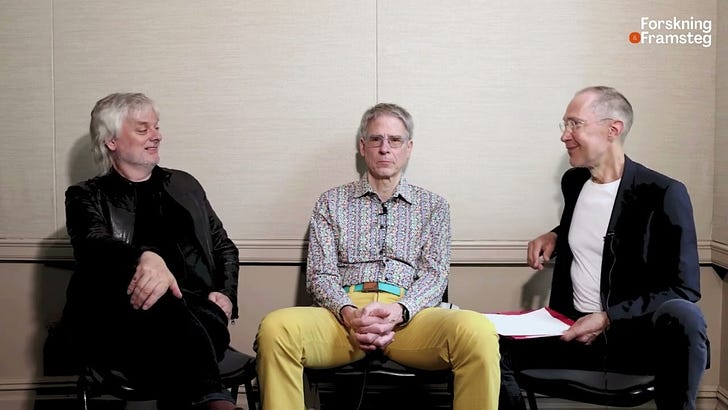“Philosopher David Chalmers and neuroscientist Christof Koch made a bet in 1998 on a breakthrough in consciousness research within 25 years. Now the bet is settled – thanks to the journalist Per Snaprud, neuroscience editor at the Swedish popular science magazine Forskning & Framsteg. Here's a conversation that was held between the three at New York university on June 24th 2023.”
Like me, Koch is a physicist that has fallen in love with neuroscience and consciousness studies. However, I’m afraid that the things in common end there. Koch is a physicalist, while I’m not, and I would have sided with Chalmers already in 1998.
For example, Koch on whether we will find the neural correlates of consciousness (NCC) declares: ”Of course, we are going to nail it. It is an empirical program, it doesn’t depend on metaphysical assumptions.”
My question: Is there anything at all that isn’t based on metaphysical assumptions? If I say: “The Himalaya is real”, am I making a statement that is free from any metaphysical assumptions? Is the concept of ‘reality’ that we have in mind an absolute, indubitable, self-explanatory concept? Do we really see things as they are in themselves? If your answer is: “Of course! When I look at the Himalaya, I see it as it is”, then, before proceeding, please read first my post here. If, instead, you agree that our concept of reality is too simplistic, then we must conclude that even a statement about the Himalaya must rely on (more or less unconscious) assumptions and presuppositions.
Now, you might say that a mountain climber couldn’t care less about this philosophical hairsplitting. This is useless abstract talk that will not help you to get to the top.
That’s right. But if you are questioning the nature of consciousness and believe it can be ‘nailed down with an empirical program’ you are dealing with a deeply philosophical question and are making a monumental metaphysical assumption in the first place. It is like believing that the Earth is the center of the universe and then looking for the ultimate phenomenon that makes the universe twirl around us. After 25 years of research (and a lost bet), you wonder what went wrong, and insist that since there are no metaphysical assumptions, it is only a matter of time and that we have to try harder.
Koch comments further on the ‘hard problem of consciousness’ (for a quick intro see my post here): “It seems hard, because if you look at the foundational equations of science, in quantum mechanics and general relativity, the periodic table of the elements, in the ATCG bases of genes there is no mention of consciousness. But here we are having conscious experiences.”
What a miracle! :)
I guess a panpsychist (someone who posits consciousness as being a fundamental and ubiquitous feature of reality) might not agree. Again, Koch is working with a metaphysical assumption while being convinced that there is none. Because in the equations of science, quantum mechanics, general relativity, the periodic table, and in genes there appears to be no consciousness only because we extracted it from the outset by making this metaphysical assumption. Science is almost per definition the intellectual activity that first extracted anything conscious by lowering everything down to human abstractions. It makes no sense to use the very same science to investigate something that it refused to acknowledge beforehand, and then wonder what miracle makes the thing we brushed aside reappear seemingly out of nothing. It is like a toddler, still in the "peek-a-boo" phase, that hides an object and then is upset that it has vanished until mom or dad makes it miraculously pop back into existence.
This is only to say that many research projects in science turned out to be unsuccessful, not because of a lack of findings, technology, or sufficient funds or time. They are intrinsically flawed from the outset. If we do not change our way of seeing, feeling, and looking at the world and life, we will invariably continue to ring around the rosie forever.
Chalmers and Koch agreed to repeat the bet. In 1948 (Chalmers and Koch will be 82 and Koch 91 years old, respectively, and hope for anti-aging technology to be still around) we will see if, thanks to the new brain scan technologies, the NCC will have been identified. I have unwavering confidence in what the outcome will be. :)




You quite perfectly summed up the essence of the confusion right here (and I love the addition of the peek a boo analogy)
in the equations of science, quantum mechanics, general relativity, the periodic table, and in genes there appears to be no consciousness only because we extracted it from the outset by making this metaphysical assumption. Science is almost per definition the intellectual activity that first extracted anything conscious by lowering everything down to human abstractions. It makes no sense to use the very same science to investigate something that it refused to acknowledge beforehand, and then wonder what miracle makes the thing we brushed aside reappear seemingly out of nothing. It is like a toddler, still in the "peek-a-boo" phase, that hides an object and then is upset that it has vanished until mom or dad makes it miraculously pop back into existence.
So maybe that means this parrot is smarter than Koch?
https://www.youtube.com/shorts/sNP_NjPVKPs